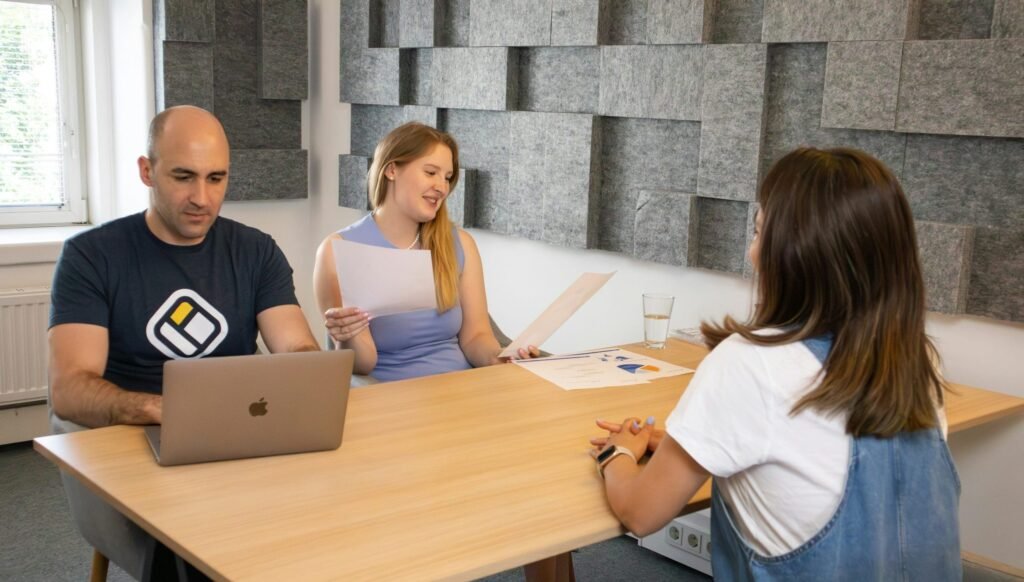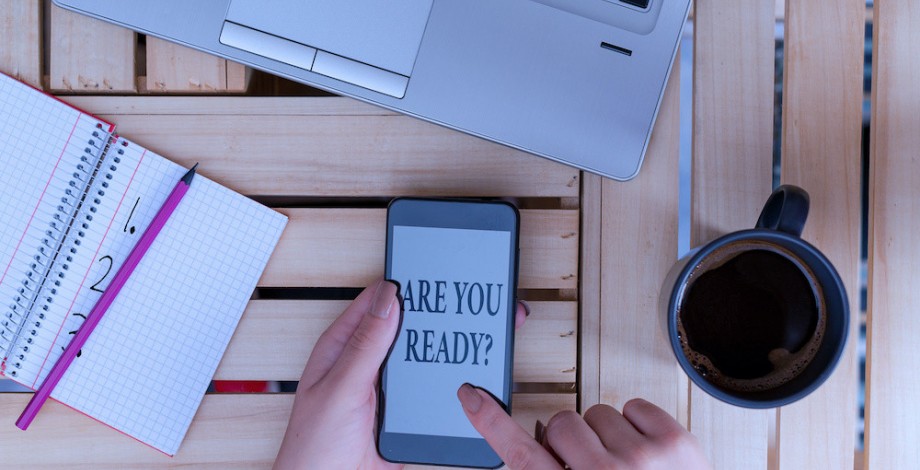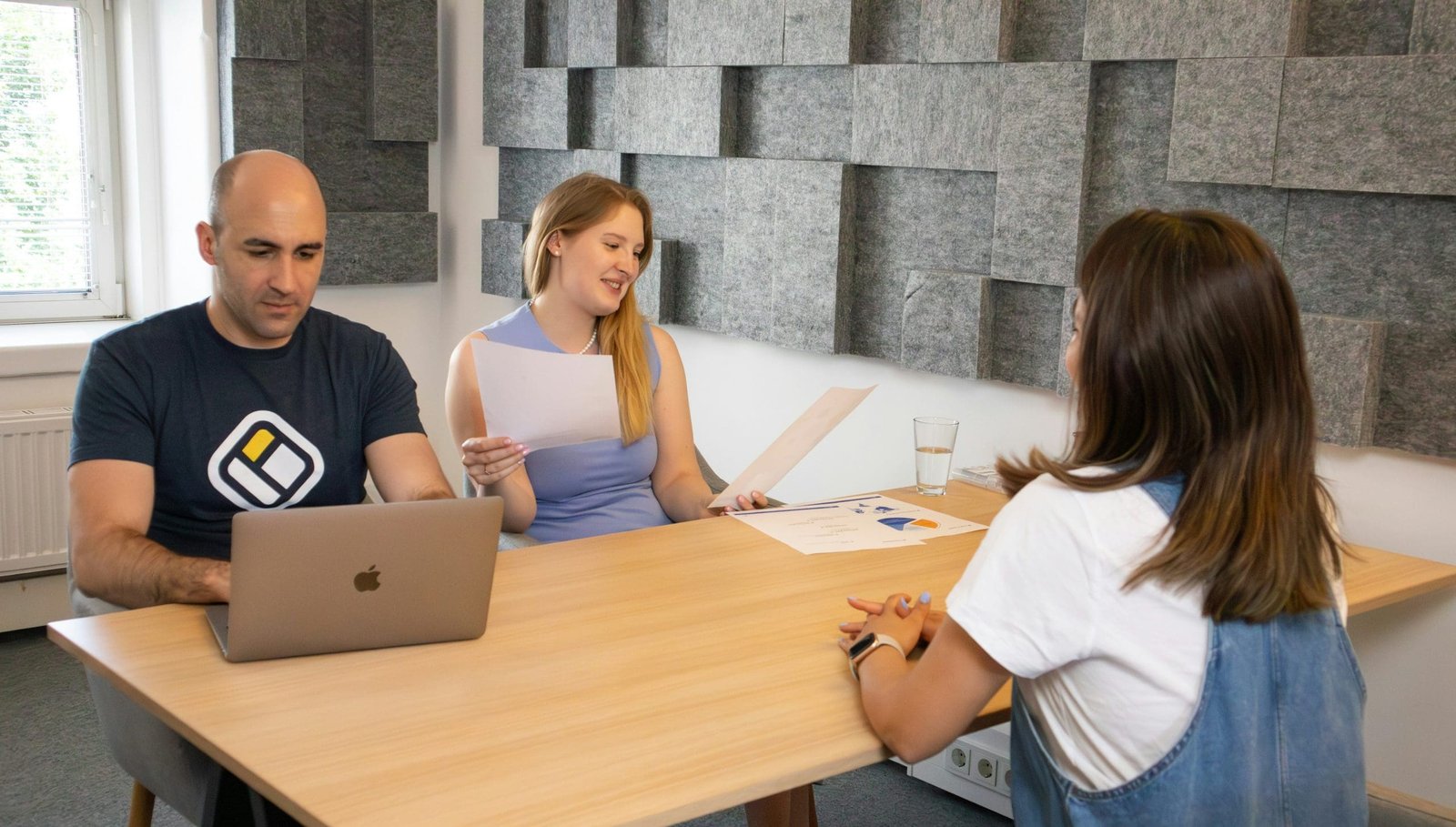
What Is an Internal Interview?
If you’re looking to switch roles or move up within your current company, you’ll likely need to go through an internal interview. This type of interview happens within your workplace, often with people you already know.
An internal interview serves the same purpose as an external one—filling an open position. It could also be a promotion interview if you’re applying for a higher role in the same company. Many employers appreciate when employees choose to grow within the organization and want to support their success.
Hiring internally means the company already knows what kind of employee they’re getting, removing much of the uncertainty. There’s also less need for orientation and training.

You might face some of the same questions as external candidates, such as:
- Why did you apply for this role?
- What are your career goals?
- Where do you see yourself in a few years?
- What are your strengths and weaknesses?
But there may also be questions specific to an internal interview, like:
- What have you done well in your current position?
- What mistakes do you think you’ve made?
- What would you do differently in the new role?
You should also be ready for the possibility of not getting the job and continuing to work alongside colleagues who know you applied.
What to Expect at an Internal Interview
Internal and external interviews share similarities and differences. The main difference is that external interviews involve candidates from outside the company, while internal ones are for current employees.
Even if you know (or work with) your interviewers, treat the situation professionally and come prepared.
You’ll likely be interviewed by a supervisor or your direct manager. For high-responsibility roles, there may be multiple interviewers.
Since it’s an internal interview, your interviewer may already be familiar with your work ethic and reputation.
How to Prepare for an Internal Interview
Just like with an external interview, there are steps to take to get ready.
Step 1. Be Well Prepared
As an internal candidate, you might think you know everything about the role—but it’s still important to research the job’s responsibilities thoroughly.

You’re in a great position to gather insights. Talk to the person currently in the role, learn about their tasks, and understand the biggest challenges they face.
Step 2. Inform Your Employer
Your current supervisor will probably find out you’re applying for another position, so it’s best they hear it from you first.
This is also a chance to get feedback on your performance. If they’re involved in the hiring process, you might learn more about the new role.
Step 3. Know How You Are Seen
Get a sense of how others perceive you at work. Are you punctual, hardworking, a team player?

Ask your supervisor and colleagues for input. Your interviewer likely already has an impression of you.
Step 4. Prepare for Interview Questions
Internal interview questions may differ slightly from external ones. Your future supervisor may ask about:
- Your current role and how you’ve performed
- What you think could be challenging in the new position
- Any changes or improvements you’d suggest
Step 5. Know the Company
Even though you already work there, research the company as if it were an external interview. You never know what questions will come up, and it shows your interest.

Step 6. Show Your Value
If you have an internal interview coming up, now’s the time to step up your game.
If you work with clients, gather positive feedback. Keep records of praise from colleagues or supervisors.
Tips for Preparing for an Internal Interview
Here are some key tips to help you succeed:
1. Understand Your New Role
Take advantage of being an internal candidate—talk to the hiring manager, the person leaving the role, and future colleagues. Learn both the good and bad aspects so there are no surprises.
2. Sell Yourself
Bring a copy of your resume and highlight your strengths. Use feedback from coworkers and clients to show how you’d excel in the role.
3. Explain Why You Want the Role
Be clear and enthusiastic about why you’re interested. Maybe it’s a step toward a bigger goal, or you’ve taken courses that align with the position.
4. Verbalize Your Achievements
Don’t downplay your successes. Mention awards, commendations, or key targets you’ve met.
5. Be Professional
Even if you know the interviewer personally, keep things formal. Show them you’re serious about the role.
6. Use the STAR Method
This technique helps structure answers to behavioral questions:

- Situation – Describe a challenge or task.
- Task – Explain your responsibilities.
- Action – Focus on what you did.
- Result – Share the outcome and what you learned.
7. Don’t Neglect Your Current Job
Keep up with your current duties—don’t let interview prep make you seem disengaged.
8. Ask Questions
Show interest by asking thoughtful questions (but avoid ones you should already know the answers to).
9. Follow Up
Send a thank-you note or email after the interview to stay on their radar and reaffirm your interest.
FAQs for Following Up After an Interview
Why is it important to send a thank-you note after an interview?
Sending a thank-you note is an essential part of the interview process. It shows professionalism, gratitude, and reinforces your interest in the position. A well-crafted thank-you note can help you stand out from other candidates and leave a positive impression on the interviewer. It also gives you a chance to reiterate why you’re a strong fit for the role.
When should I send a thank-you note after an interview?
It’s ideal to send your thank-you note within 24 hours of the interview. This demonstrates promptness and enthusiasm. You can send an email or handwritten note, but in most cases, an email is the quickest and most effective way to follow up. Be sure to send it as soon as possible to keep your name fresh in the interviewer’s mind.
What should I include in a thank-you note?
A good thank-you note should include:
- Express gratitude: Start by thanking the interviewer for their time and consideration.
- Reaffirm your interest: Highlight your enthusiasm for the role and the company.
- Mention a key point from the interview: Reference something specific discussed during the interview that reinforces your fit for the position.
- End with a positive note: Close by expressing your excitement about the next steps and your eagerness to contribute to the team.
Keep it concise and professional.
Should I send a thank-you note if I feel the interview didn’t go well?
Yes, even if you feel the interview didn’t go well, sending a thank-you note is still a good idea. It shows professionalism, gratitude, and maturity, and it leaves a positive impression. You can use the note to clarify any points or add any information you forgot to mention during the interview. It’s always better to express your thanks and keep the door open for future opportunities.
Can I follow up more than once after an interview?
While it’s important to be polite and respectful, you can follow up more than once if you haven’t heard back within the timeline discussed during the interview. If they said they’d contact you within a week, for example, you can send a gentle follow-up email after the week has passed. Keep your tone friendly, concise, and professional. Avoid sending too many emails, as this can be seen as overly persistent or pushy.
How long should my thank-you note be?
A thank-you note should be brief—typically no longer than a few short paragraphs. You want to convey your appreciation and reinforce your interest in the role without overwhelming the interviewer with too much information. Keep it clear, sincere, and to the point.
Can I use a template for my thank-you note?
While it’s fine to use a template, you should customize your thank-you note for each interview. Reference something specific from the conversation, such as a particular challenge discussed or how your skills align with the team’s needs. Personalization makes the note feel more genuine and thoughtful.
Should I thank everyone I interviewed with?
Yes, if you had multiple interviewers, be sure to thank each person individually. Send a personalized thank-you note to everyone you spoke with, acknowledging their specific role in the interview process and reiterating your interest in the position. This shows attention to detail and respect for everyone involved.
What if I’m unsure of the right person to send the thank-you note to?
If you’re unsure who the main contact is for follow-up, you can send the thank-you note to the person who coordinated your interview (usually the recruiter or hiring manager). Alternatively, if you had multiple interviewers, you can send individual notes to each one or address your follow-up to the lead interviewer and ask them to pass along your thanks to others.
What is the best way to follow up if I don’t get a response to my thank-you note?
If you don’t receive a response after sending your thank-you note, wait at least a week or two before sending a polite follow-up email. In the follow-up, express your continued interest in the position and ask about the status of your application. Avoid being overly pushy; instead, frame your follow-up as a gentle check-in.
Conclusion
Sending a thank-you note is a simple yet powerful way to stay on an interviewer’s radar and reinforce your interest in the job. A thoughtful, personalized thank-you note can help you stand out and leave a lasting positive impression. Following up after the interview, while being respectful of their time, shows your professionalism and enthusiasm, potentially giving you the edge you need to land the job. Just remember to keep it polite, concise, and genuine!






